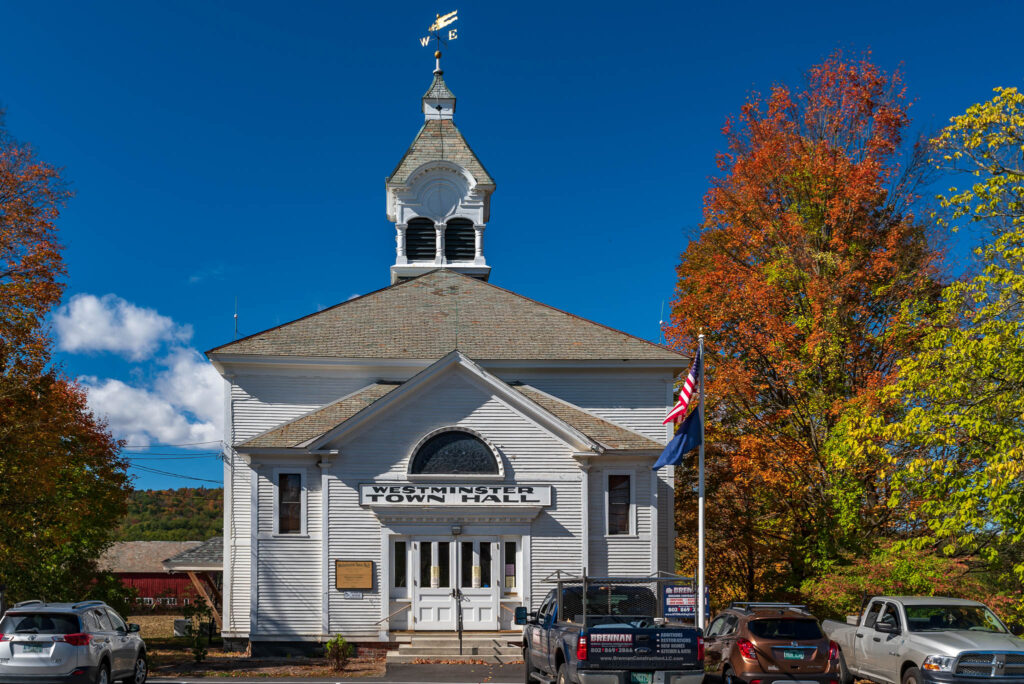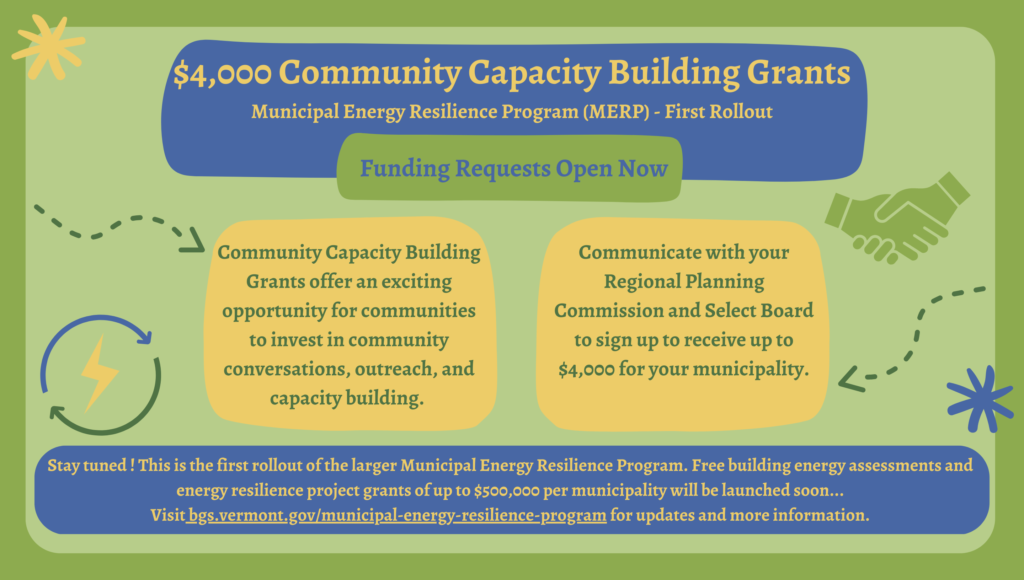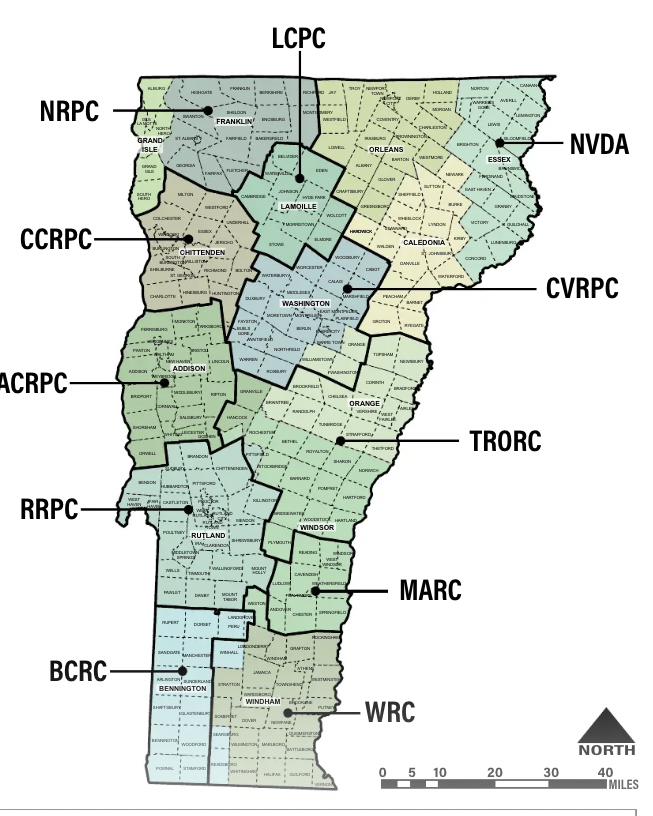Municipal Energy Resources

Learn about how your community can maximize state and federal funding, including resources and recommendations for working with municipalities to support strategic investments in cost-saving and fossil fuel-reducing projects.

Sign up for Community Capacity Building Funding here!
VECAN Resources:
Draft memo for town energy committees to utilize in reaching out to their Selectboards, highlighting the importance of making municipal investments in energy projects, and begin building relationships with town officials. Find the DRAFT memo, which each energy committee should customize to their particular situation, here.
Draft Municipal Energy Action Planning Tool to assist town energy committees in inventorying municipal buildings and systems, tracking energy audit or walkthrough recommendations, and recording the age, anticipated replacement date, and essential statistics for municipal energy systems, so that your community can best plan for its renewable energy transition. Find the DRAFT Municipal Energy Action Planning Tool here.
Vermont League of Cities and Towns Resources:
Vermont League of Cities and Towns (VLCT), with the support of the Vermont Legislature and Governor Phil Scott, established their American Rescue Plan Act (ARPA) Assistance and Coordination Program to support Vermont’s towns, cities and villages that chose to accept ARPA funding. Find all information on ARPA, and related resources and guidance from VLCT here.
VLCT’s summary of guidance for Vermont municipalities as they consider how to best dedicate and expend ARPA funding, which has been updated to reflect the final guidance from the U.S. Department of the Treasury in 2022. Find updated information about utilizing ARPA funding in your municipality here.
At VECAN’s March 16th workshop, Katie Buckley, Director of the ARPA Coordination & Assistance Program at VLCT, gave a presentation with guidance tailored to energy committees interested in helping their communities make strategic energy investments using ARPA funding. Find VLCT’s presentation on ARPA guidance for energy committees here.
Efficiency Vermont Resources:
By increasing the energy efficiency of buildings, towns can strengthen community resilience. Projects can help insulate the town from problems with aging infrastructure, extreme weather, and rising fuel prices. Energy costs can be a significant line item in a town’s annual operating budget. Local governments can get energy cost savings across town facilities by working with Efficiency Vermont. Efficiency Vermont can identify impactful efficiency opportunities, provide support through the course of a project, connect towns with contractors, and provide rebates for qualifying projects.
The first step in working with Efficiency Vermont is signing up for a free energy walk-through of your town buildings. Encourage your town officials to sign up for a consultation here. Please note a town employee or elected official must sign up for the walk-through.
Regional Planning Commission Resources:
At VECAN’s recent workshop, Ann Janda, Senior Energy Project Manager at the Chittenden County Regional Planning Commission, gave a presentation for energy committees with tips and recommendations for working with municipalities to support strategic investments in cost-saving and fossil fuel-reducing projects. Find CCRPC’s presentation on strategic municipal energy investments here.
All of Vermont’s 11 RPCs have now hired or designated existing staff to work on energy, including supporting energy committees’ efforts. Find the contact information of the energy planner at your RPC here, or below:

Energy Contacts at Vermont Regional Planning Commissions
Addison County Regional Planning Commission (ACRPC)
Maddison Shropshire – Energy Planner
Bennington County Regional Commission (BCRC)
Callie Fishburn – Regional Planner/Energy Program Coordinator
Central Vermont Planning Commission (CVRPC)
Sam Lash – Planner, Energy and Climate
Chittenden County Regional Planning Commission (CCRPC)
Ann Janda – Senior Energy Project Manager
Lamoille County Planning Commission (LCPC)
Meghan Rodier – Regional Planner
Mount Ascutney Regional Commission (MARC)
Martha Harrison
Northeastern Vermont Development Association (NVDA)
Allie Webster – Energy Planner
Northwest Regional Planning Commission (NRPC)
Marlena Valenta – Energy and Climate Planner
Rutland Regional Planning Commission (RRPC)
Barbara Noyes Pulling – Senior Planner
Two Rivers-Ottauquechee Regional Commission (TRORC)
Harry Falconer
Windham Regional Commission (WRC)
Margo Ghia – Planner, Natural Resources
Other possible efficiency and conservation initiatives include:
- Improving efficiency in residential buildings by promoting home energy audits
- Adopting town master plans and zoning bylaws that promote efficiency
- Adopting energy efficient building codes
- Implementing efficiency measures in municipal and/or school buildings
- Converting municipal street lighting
Check out these Heating Efficiency Success Stories to see how Vermonters are working hard to reduce heating needs through efficiency efforts.
Visit the Vermont Community Energy Dashboard to find resources for municipalities to cut energy use.
Municipal Energy Resilience Program (MERP)

MERP will provide the following funding opportunities:
- Free building energy assessments
- Up to $4,000 grants for energy resilience community capacity building – available now here!
- Up to $500,000 grants for building renovation projects regarding weatherization, thermal efficiency, and supplementing or replacing fossil fuel heating systems with more efficient renewable or electric alternatives.
Vermont Department of Buildings and General Services (BGS), in partnership with Efficiency Vermont (EVT), Vermont League of Cities and Towns (VLCT), and our 11 Regional Planning Commissions (RPCs) will support Vermont municipalities with staffing and technical assistance, as well as grant funding for energy efficiency projects to reduce costs and greenhouse gas emissions.
This pilot program will run through December 31st, 2026. Modeled after SEMP, the program will help municipalities track their energy use, audit their worst performing buildings, and implement energy conservation measures.
